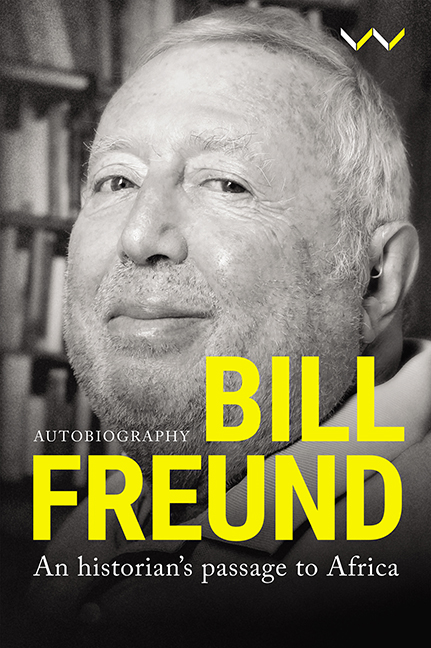Book contents
- Frontmatter
- Contents
- Foreword: Bill Freund and the Making of His Autobiography
- Family Tree
- A Brief Introduction
- 1 The Austrian Past
- 2 The Aftermath of War: A Perilous Modernity
- 3 The Dark Years
- 4 A New Life in America
- 5 Adolescence: First Bridge to a Wider World
- 6 As a Student: Chicago and Yale
- 7 As a Student: Africa and England
- 8 The Tough Years Begin
- 9 An Intellectual and an African: Nigeria
- 10 An Intellectual and an African: Dar es Salaam and Harvard
- 11 South Africa, My Home
- Notes
- Select Bibliography of Bill Freund’s Publications
- List of Illustrations
- Author’s Acknowledgements
- Supplementary Acknowledgements
- Index
2 - The Aftermath of War: A Perilous Modernity
Published online by Cambridge University Press: 15 June 2021
- Frontmatter
- Contents
- Foreword: Bill Freund and the Making of His Autobiography
- Family Tree
- A Brief Introduction
- 1 The Austrian Past
- 2 The Aftermath of War: A Perilous Modernity
- 3 The Dark Years
- 4 A New Life in America
- 5 Adolescence: First Bridge to a Wider World
- 6 As a Student: Chicago and Yale
- 7 As a Student: Africa and England
- 8 The Tough Years Begin
- 9 An Intellectual and an African: Nigeria
- 10 An Intellectual and an African: Dar es Salaam and Harvard
- 11 South Africa, My Home
- Notes
- Select Bibliography of Bill Freund’s Publications
- List of Illustrations
- Author’s Acknowledgements
- Supplementary Acknowledgements
- Index
Summary
The war was the end of the good times, the secure times. What remained of Austria was the rump republic with today's frontiers. Adjusting the economy to this new reality was a long, slow, harsh process. A frail, credit-dependent recovery lasted only until the Great Depression set in, bringing more hard times. The aristocrats left Vienna for the new countries where they held land in the former provinces. Vienna began a descent into provincialism. Its population, one-third of the total in the new country, started to decline and continued to fall for almost a century, until very recently. A more modern society struggled to emerge in a context where there were more losers than winners.
All the same, the Jewish middle class was better equipped, through its practicality and its educational qualifications, to weather the storm economically. Grosspapa Munk, more or less retired, would live until 1923 when he died, to the great sorrow of my eleven-year-old mother. She and her mother Lucie had spent the war years in his charge, while Josef Gross was away.
On his return from the army, Josef, having given up his own venture, became a partner in Markus Munk, Junior. After some time, the business in Marienbad was sold to a relative who was now a Czechoslovak and a new summer trade locale was taken up in the mountain spa of Bad Gastein in the south of the Salzkammergut. Over the years, this business did very well. The premises on the Stephansplatz were desired by a neighbouring café and the lucrative sale meant that the firm could move into the premier shopping street of Vienna, the Kärntnerstrasse, which runs between the Stephansplatz and the Opera.
My Gross grandparents rented a large apartment in Hietzing only five minutes’ walk from the entrance to the grounds of the magnificent old summer palace of Schönbrunn. This was a desirable neighbourhood which was considered quiet and green. They employed a servant and, after the season in Gastein had ended, they took holidays in France, Germany and Italy during the 1920s. There was always a sort of governess with whom to leave the girls; the best-loved was Lizzi. Lizzi's mother was an impecunious aristocrat who would come to the flat and play mournful renditions of ‘Glow, Little Glow-Worm’ on the piano. As a gift, she gave my mother the collected letters of the Mendelssohn family.
- Type
- Chapter
- Information
- Bill FreundAn Historian's Passage to Africa, pp. 17 - 30Publisher: Wits University PressPrint publication year: 2021



